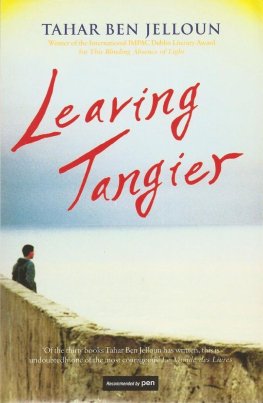Tahar Ben Jelloun - Leaving Tangier
Here you can read online Tahar Ben Jelloun - Leaving Tangier full text of the book (entire story) in english for free. Download pdf and epub, get meaning, cover and reviews about this ebook. year: 2009, publisher: Arcadia Books, genre: Prose. Description of the work, (preface) as well as reviews are available. Best literature library LitArk.com created for fans of good reading and offers a wide selection of genres:
Romance novel
Science fiction
Adventure
Detective
Science
History
Home and family
Prose
Art
Politics
Computer
Non-fiction
Religion
Business
Children
Humor
Choose a favorite category and find really read worthwhile books. Enjoy immersion in the world of imagination, feel the emotions of the characters or learn something new for yourself, make an fascinating discovery.
- Book:Leaving Tangier
- Author:
- Publisher:Arcadia Books
- Genre:
- Year:2009
- Rating:3 / 5
- Favourites:Add to favourites
- Your mark:
- 60
- 1
- 2
- 3
- 4
- 5
Leaving Tangier: summary, description and annotation
We offer to read an annotation, description, summary or preface (depends on what the author of the book "Leaving Tangier" wrote himself). If you haven't found the necessary information about the book — write in the comments, we will try to find it.
Leaving Tangier — read online for free the complete book (whole text) full work
Below is the text of the book, divided by pages. System saving the place of the last page read, allows you to conveniently read the book "Leaving Tangier" online for free, without having to search again every time where you left off. Put a bookmark, and you can go to the page where you finished reading at any time.
Font size:
Interval:
Bookmark:
Tahar Ben Jelloun
Leaving Tangier
Translators Note
Leaving Tangier is about leaving home: emigrating, going into exile, taking leave of ones country, ones friends and family, even ones senses. The many ties that bind the characters in Leaving Tangier to what they have left behind tug on their heartstrings in different ways, some of which evoke geographical, historical, or cultural references to a world that may well be unfamiliar to an English reader. I have provided endnotes to illuminate the meaning of such allusions, and an asterisk by a word in the text means that the term is explained in these notes at the end of the book.
~ ~ ~
My Cameroonian friend Flaubert says Here I am! when hes leaving and Were together! to say goodbye. A way to ward off bad luck. In this novel, those who leave arent planning to return, and when they leave someone, its for good. Flaubert, who studied a few pages of Madame Bovary in school, has promised to read this entire book as soon as summer vacation begins, when he goes home.
1. Toutia
IN TANGIER, in the winter, the Caf Hafa* becomes an observatory for dreams and their aftermath. Cats from the cemetery, the terraces, and the chief communal bread oven of the Marshan district gather round the caf as if to watch the play unfolding there in silence, and fooling nobody. Long pipes of kif pass from table to table while glasses of mint tea grow cold, enticing bees that eventually tumble in, a matter of indifference to customers long since lost to the limbo of hashish and tinselled reverie. In the back of one room, two men meticulously prepare the key that opens the gates of departure, selecting leaves, then chopping them swiftly and efficiently. Neither man looks up. Leaning back against the wall, customers sit on mats and stare at the horizon as if seeking to read their fate. They look at the sea, at the clouds that blend into the mountains, and they wait for the twinkling lights of Spain to appear. They watch them without seeing them, and sometimes, even when the lights are lost in fog and bad weather, they see them anyway.
Everyone is quiet. Everyone listens. Perhaps she will show up this evening. Shell talk to them, sing them the song of the drowned man who became a sea star suspended over the straits. They have agreed never to speak her name: that would destroy her, and provoke a whole series of further misfortunes. So the men watch one another and say nothing. Each one enters his dream and clenches his fists. Only the waiters and the tea master, who owns the caf, remain outside the circle, preparing and serving their fare with discretion, coming and going from terrace to terrace without disturbing anyones dream. The customers know one another but do not converse. Most of them come from the same neighbourhood and have just enough to pay for the tea and a few pipes of kif. Some have a slate on which they keep track of their debt. As if by agreement, they keep still. Especially at this hour and at this delicate moment, when their whole being is caught up in the distance, studying the slightest ripple of the waves or the sound of an old boat coming home to the harbour. Sometimes, hearing the echo of a cry for help, they look at one another without turning a hair.
Yes, she might appear, and reveal a few of her secrets. Conditions are favourable: a clear, almost white sky, reflected in a limpid sea transformed into a pool of light. Silence in the caf; silence on all faces. Perhaps the precious moment has arrived at last she will speak!
Occasionally the men do allude to her, especially when the sea has tossed up the bodies of a few drowned souls. She has acquired more riches, they say, and surely owes us a favour! They have nicknamed her Toutia, a word that means nothing, but to them she is a spider that can feast on human flesh yet will sometimes warn them, in the guise of a beneficent voice, that tonight is not the night, that they must put off their voyage for a while.
Like children, they believe in this story that comforts them and lulls them to sleep as they lean back against the rough wall. In the tall glasses of cold tea, the green mint has been tarnished black. The bees have all drowned at the bottom. The men no longer sip this tea now steeped into bitterness. With a spoon they fish the bees out one by one, placing them on the table and exclaiming, Poor little drowned things, victims of their own greediness!
As if in an absurd and persistent dream, Azel sees his naked body among other naked bodies swollen by seawater, his face distorted by salt and longing, his skin burnt by the sun, split open across the chest as if there had been fighting before the boat went down. Azel sees his body more and more clearly, in a blue and white fishing boat heading ever so slowly to the centre of the sea, for Azel has decided that this sea has a centre and that this centre is a green circle, a cemetery where the current catches hold of corpses, taking them to the bottom to lay them out on a bank of seaweed. He knows that there, in this specific circle, a fluid boundary exists, a kind of separation between the sea and the ocean, the calm, smooth waters of the Mediterranean and the fierce surge of the Atlantic. He holds his nose, because staring so hard at these images has filled his nostrils with the odour of death, a suffocating, clinging, nauseating stench. When he closes his eyes, death begins to dance around the table where he sits almost every day to watch the sunset and count the first lights scintillating across the way, on the coast of Spain. His friends join him, to play cards in silence. Even if some of them share his obsession with leaving the country someday, they know, having heard this one night in Toutias voice, that they must not give in to the siren call of sadness.
Azel says not a word about either his plan or his dream. People sense that he is unhappy, on edge, and they say he is bewitched by love for a married woman. They believe he has flings with foreign women and suspect that he wants their help to leave Morocco. He denies this, of course, preferring to laugh about it. But the idea of sailing away, of mounting a green-painted horse and crossing the sea of the straits, that idea of becoming a transparent shadow visible only by day, an image scudding at top speed across the waves that idea never leaves him now. He keeps it to himself, doesnt mention it to his sister, Kenza, still less to his mother, whos upset because hes losing weight and smoking too much.
Even Azel has come to believe in the story of she who will appear and help them to cross, one by one, that distance separating them from life, the good life, or death.
2. Al Afia
WHENEVER AZEL LEAVES that sea-green circle of silent and lonely reverie, he feels cold and shivers slightly, no matter what the season. Instinctively, he turns away from the night, refusing to enter it. He walks in the city, speaking to no one, imagining that he is a tailor, a special kind of couturier, sewing the narrow lanes to the wide avenues with white thread, as in that story his mother used to tell him when he had trouble falling asleep. He wants to find out if Tangier is a mans djellaba* or a brides caftan, but the city has grown so much that his quest becomes hopeless.
One February night in 1995, Azel decided to abandon his sewing, convinced that Tangier was no longer a garment but one of those synthetic wool blankets brought back from Belgium by migrs. The city was hidden beneath a fabric that trapped warmth without dispelling humidity. Tangier no longer had any shape, any centre; instead, it had lopsided public squares from which cars had dislodged the peasant women who once came from Fahs to sell their fruits and vegetables.
Font size:
Interval:
Bookmark:
Similar books «Leaving Tangier»
Look at similar books to Leaving Tangier. We have selected literature similar in name and meaning in the hope of providing readers with more options to find new, interesting, not yet read works.
Discussion, reviews of the book Leaving Tangier and just readers' own opinions. Leave your comments, write what you think about the work, its meaning or the main characters. Specify what exactly you liked and what you didn't like, and why you think so.










